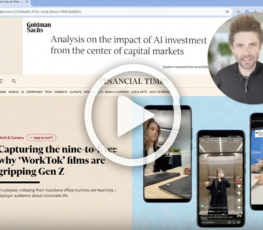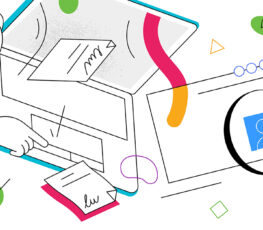There’s only one company that can compete with the major social networks in terms of users and engagement: OpenAI.
Are OpenAI and the major social networks headed for a collision? Who knows? (Meta sure isn’t going to take it lying down.) But it’s definitely worth thinking about — especially if you’re a marketer!
I had a chance to talk with Scrunch AI CEO Chris Andrew the other day about SEO, and he shared a dashboard with me highlighting the referral traffic EveryoneSocial receives from ChatGPT and other AI apps. While it’s nowhere near the traffic we see from Google, it’s headed in that direction.
And it got me thinking about who these visitors were. What were they asking?
Just the other day I used ChatGPT for a research project that led me to a service provider that I may spend a bunch of money with.
Search is totally different. You have to ask the questions and sift through the results. You’re clearly talking with a computer.
But ChatGPT is basically another person, and one thing we know is that people are FAR more likely to make purchasing decisions that are recommended by a trusted connection…
Because ChatGPT is friendly, helpful, smart, patient, and always there to answer your questions, does that make it a trusted companion? I think it does. It’s why my wife refers to ChatGPT as simply “Chat.”
This is why people like Yuval Harari worry about AI: Because it’ll soon be at a place where we can’t distinguish it from another human. And in many ways it’s better than another human because it’s more helpful, more patient, etc. (Have you ridden in a Waymo vehicle? Best driver I’ve ever had!)
As the CEO of a B2B software company, I’m very excited for ChatGPT (and maybe others) to be the primary starting point for “search.” No doubt content marketers will do their best to figure out how to exploit it like they did with search, but I think it’s going to be harder to do. I think starting a search with ChatGPT is going to be really beneficial for good businesses, those companies that customers love and that provide real value. And I think it’s going to be bad for poor businesses because I don’t think you’re going to be able to BS Chat. It’s all-knowing and has a strong BS meter!
It can be very hard to tell the difference between a good and a bad vendor, especially in B2B. After all, buyers are constantly being marketed to, and the vendors they go with are often the ones with the best marketing — not necessarily the ones with the best offerings. In these cases, the buyers simply connected with the right people who said the right things and made the buyers feel special.
But if you have a super smart trusted connection like ChatGPT that’s weighing all the options and guiding you toward the best solution… Well, it’s hard to see marketing and sales winning the day in that world.
What does all this have to do with advocacy? Like I said earlier, people are far more likely to make purchasing decisions based on recommendations from trusted connections, and these days a lot of those connections and recommendations are found on social.
In fact, 71% of decision-makers say social is influential when considering or researching a new product for their company, so if people aren’t talking about your product on social — especially the people you employ — you’re missing out on a massive part of the market.
















